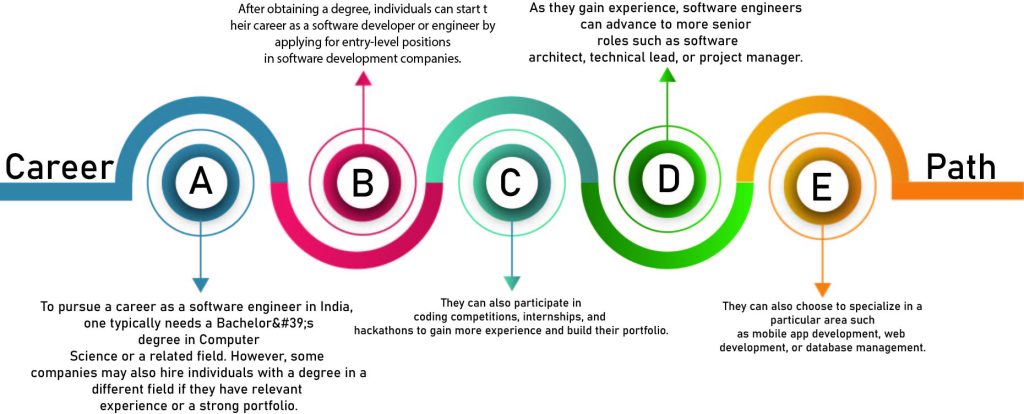Software engineering is the process of designing, creating, testing, and maintaining software
applications using a structured approach. It involves the use of engineering principles and
methods to develop high-quality, reliable, and efficient software systems that meet the needs
of users and organizations. Software engineers use various tools, techniques, and programming
languages to create software applications that are easy to use, scalable, and maintainable. The
software engineering process typically involves requirements gathering, design, coding, testing,
and maintenance, with a focus on ensuring that the software is delivered on time and within
budget while meeting the specified requirements.

Work description
The work description of a software engineer typically includes:
Designing and developing software applications
Writing and testing code
Collaborating with cross-functional teams to develop and implement software solutions
Troubleshooting and debugging software issues
Maintaining and updating software systems
Conducting code reviews and ensuring coding standards are followed
Researching new technologies and methodologies to improve software development processes
Participating in software development projects from conception to delivery
Providing technical support and guidance to end-users
Continuously learning and improving skills and knowledge related to software development.
High Demand
High demand: With the increasing reliance on technology in all industries, software engineering
is a high-demand career with many job opportunities.
Lucrative salaries
High earning potential: Software engineers typically have high earning potential, with
competitive salaries and opportunities for career advancement.
Opportunities for innovation
Job flexibility: Many software engineering roles offer flexibility in terms of work location and
schedule, with the possibility of remote work or flexible hours.
Versatility
Intellectual challenge: Software engineering is a mentally stimulating field that offers constant
opportunities for problem-solving and innovation.
Flexibility
Job satisfaction: Building software that solves real-world problems and meets the needs of
users can be very rewarding.
Job satisfaction
Many computer engineers find the work challenging and rewarding, as they have the opportunity to solve complex problems and make a significant impact in their field.
High stress
High pressure: Software engineering can be a high-pressure job, with tight deadlines and high
expectations for quality and performance.
Long hours
Long hours: Working on complex projects may require long hours and extended periods of
concentration, which can lead to burnout.
Competitive field
Rapidly evolving technology: The software engineering field is constantly evolving, which
requires ongoing learning and staying up to date with new technologies and methodologies.
Constant learning
Isolation: Some software engineering roles may require working independently for long periods
of time, which can be isolating.
Isolation
Sedentary lifestyle: Sitting in front of a computer for long periods of time can lead to a
sedentary lifestyle, which can have negative health consequences.
Eye strain and other physical health issues
Staring at computer screens for long periods of time can cause eye strain and other physical health issues, such as back pain and repetitive strain injuries.
The cost of education for pursuing a career in software engineering can vary depending on the type of
degree, the institution, and the location in India.
The cost of a 4-year bachelor's degree in software engineering in India can range from INR 2-10 lakhs
per year, depending on the institution.
Master's degree: The cost of a 2-year master's degree in software engineering in India can range from
INR 1-5 lakhs per year, depending on the institution.
PhD: The cost of a 3-5 year PhD program in software engineering in India can vary widely depending on
the institution and the area of research, but it is generally fully funded by the university or government
agencies.
Moreover, the cost of education may also include additional expenses such as accommodation,
transportation, textbooks, and other study materials.
[wpcharts type=”horizontalbarchart” bgcolor=”red:gray:yellow,blue:gray:yellow,random:gray:yellow,purple:gray:yellow” min=”0″ legend=”true” titles=”2 year , 5 year” values=”3,7,5,12″]
The earning potential of a software engineer in India varies depending on a variety of factors such as
experience, skillset, location, and the type of company they work for.
Software engineers with more experience generally earn higher salaries. A software engineer with 1-4
years of experience in India can earn an average salary of INR 4-8 lakhs per year, while a software
engineer with 10-19 years of experience can earn an average salary of INR 20-25 lakhs per year.Software engineers with specialized skills or experience in high-demand areas such as artificial
intelligence, machine learning, or cybersecurity can command higher salaries. For example, a machine
learning engineer in India can earn an average salary of INR 8-20 lakhs.
The location where a software engineer works can also impact their earning potential. Generally,
software engineers working in major metropolitan areas such as Bangalore, Mumbai, or Delhi tend to
earn higher salaries than those working in smaller cities or rural areas. For example, a software engineer
in Bangalore can earn an average salary of INR 6-17 lakhs.
[wpcharts type=”horizontalbarchart” bgcolor=”red:gray:yellow,blue:gray:yellow,random:gray:yellow,purple:gray:yellow” min=”0″ legend=”false” titles=”Entry-Level, Mid-Career, Senior-Level ” values=”5,15,25,35,45,55″]
Strong analytical and problem-solving skills
Ability to think logically and critically
Creativity and innovation.aProficiency in programming languages such as Java, Python, C++, etc.
Familiarity with database technologies and data structures
Good understanding of software development methodologies and tools
Creativity and innovation in finding solutions to complex problems
Attention to detail and ability to write efficient and optimized code
Lack of attention to detail and carelessness in writing code
Poor time management and procrastination
Difficulty working collaboratively in a team
Resistance to feedback and unwillingness to learn from mistakes
Inability to adapt to new technologies and frameworks
Lack of curiosity and interest in learning about the latest developments in the field
Difficulty in communicating technical concepts to non-technical stakeholders
Work-life balance
The work-life balance of a software engineer can vary depending on the company they work for and the
project they are working on. However, in general, software engineering is known to be a demanding and
challenging profession, often requiring long hours and intense focus to meet project deadlines.
On one hand, software engineers are known for having flexible work schedules and the ability to work
remotely, which can allow for greater work-life balance. Many software engineering roles offer the
opportunity to work from home, which can help reduce commuting time and allow for more time spent
with family and personal hobbies.
On the other hand, software engineering projects can be complex and time-consuming, requiring a high
level of focus and attention to detail. This can sometimes lead to long hours, including nights and
weekends, especially when deadlines are approaching.
Overall, achieving a healthy work-life balance as a software engineer requires a combination of
discipline, effective time management, and a supportive work environment that values the well-being of
its employees.

Software engineering drives the development and advancement of technology, leading to
improvements in various fields such as healthcare, transportation, and education.
Software engineering can improve accessibility to information and services, providing more
opportunities for individuals regardless of their location or physical abilities.
The ability to work remotely and collaborate with individuals from around the world has led to
increased globalization in the software engineering industry.
Software engineers have a responsibility to consider the ethical implications of their work, such
as privacy and data security concerns.
As technology continues to advance, the demand for software engineers grows, leading to job
creation and potential economic benefits.
Pursuing a career in software engineering can provide opportunities for individuals to develop
valuable technical skills that can be applied in various industries.
Artificial Intelligence Machine Learning
Full-stack development: The ability to work with both front-end and back-end development, including
knowledge of databases, APIs, and web development frameworks.
Cyber security
Mobile app development: Specialization in developing applications for mobile devices such as
smartphones and tablets, often including knowledge of iOS or Android development.
Software Engineering
Web development: Specialization in developing websites and web applications, including knowledge of
HTML, CSS, and JavaScript, and various web development frameworks.
Data Science Machine Learning
DevOps: Specialization in automating and optimizing the software development process, including
knowledge of continuous integration/continuous deployment (CI/CD), infrastructure management, and
cloud technologies.
Computer Networks
Machine learning: Specialization in developing algorithms and models that allow software to learn from
data, including knowledge of programming languages such as Python and data analysis tools.
Conclusion:
In conclusion, pursuing a career in software engineering can offer a variety of benefits, including
financial stability, career growth opportunities, and the ability to contribute to technological innovation.
Specializations within the field, such as mobile app development, cybersecurity, and cloud computing,
offer further opportunities for skill development and career advancement. As technology continues to
advance, the demand for software engineers is expected to grow, making it an attractive and potentially
lucrative career choice.



